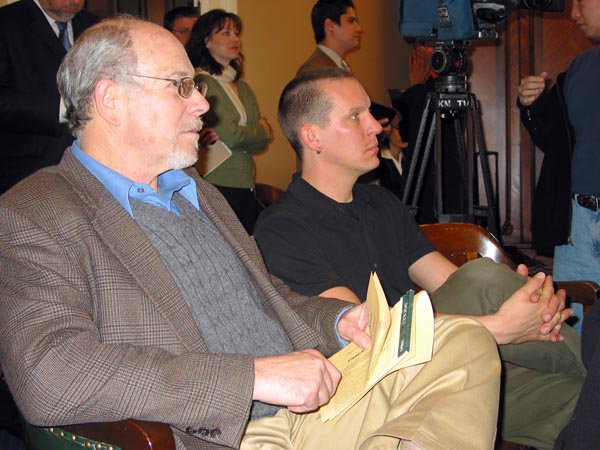Bill would probe pay

Sacramento State professors Jeffrey Lustig, left, and Kevin Wehr listen as Assemblyman Portantino announces the introduction of AB 1413 on Friday.:
March 15, 2007
Assemblymembers Anthony Portantino and Julia Brownley announced their introduction of “The California State University Reform, Trust and Responsibility Act” at a Feb. 28 press conference in the State Capitol. Assembly 1413 would limit CSU executive compensation packages and establish more legislative oversight of the CSU Governance Board.
“Reform (is needed) to hold chief managers accountable for these inordinate raises. They’re pilfering academic programs for their own salaries,” said Sacramento State government professor Jeffrey Lustig, a vocal California Faculty Association member who attended the press conference in support of the reform bill.
AB 1413 follows a request to audit the CSU system submitted to the Joint Legislative Audit Committee by Portantino and two other Assembly members two weeks ago. If the committee decides to approve the audit, executive hiring and compensation at all CSU campuses will be thoroughly scrutinized.
Reforming the CSUThe bill, authored by Portantino and Brownley, would require all executive compensation packages be fully disclosed and approved in public session. Brownley explained that though negotiations could be done in private, approval “must be done with the public watching.”
AB 1413 would also mandate actual teaching and a salary commensurate with a full-time faculty member’s current salary for executives granted professorships.
“While they enjoy lavish compensation packages, students are being hit with raised fees,” Brownley said. “Priority number one is providing the best education for California’s students.”
In addition to compensation reform, the CSU reform bill would also restructure the CSU governing board by adding two legislative-appointed members to the 16 governor-appointed currently seated, allowing for increased legislative oversight of the board.
Senator Gloria Romero, a graduate of CSU San Bernardino and member of the California Faculty Association, said she wanted more transparency in the governing board and vowed to work for the bills approval in the California Senate.
“Trustees have been operating in the dark of night. It’s a period for sunshine and accountability,” Romero said.
Contentious ClimatePortantino said both the audit and the bill were prompted by recent media coverage of “questionable” practices by the CSU system, citing the generous severance packages and “ghost professorships” given to executives that were uncovered in The San Francisco Chronicle.
“It concerns me that legitimate questions were raised in the media about certain practices both on executive compensation and how the CSU system makes its decisions,” Portantino said. “Certainly, it’s good to raise the questions but I want to have the answers.”
Sac State sociology professor Kevin Wehr said he only has to look at his paycheck and hear student gripes about tuition hikes to know the answer lies in a lack of priorities in spending.
“Students fees almost doubling in the last five years while faculty salaries are stagnating,” Wehr said. “Meanwhile, we see executive compensation ballooning out of control.”
CSU spokesperson Paul Browning said executive compensation is not excessive.
“Their salaries are lower on average compared to what administrators throughout the country are making,” Browning said. He contends that CSU needs to offer competitive executive compensation packages to attract and retain talented administrators for the CSU system.
Wehr, unappeased by the argument, said the rationale doesn’t apply equally even though various workers in the CSU system are underpaid.
“I would buy that line if they actually held that to be true across the system but I’m underpaid,” he said. “If they actually held that to be the standard across various worker categories, it’d be legitimate.”
Browning said the CSU is considering another round of executive raises once a new faculty contract is approved by CFA.
Public TrustPortantino hopes the bill will regain public trust in higher education, securing its future by garnering voters’ willingness to fund it.
“This is an effort to win public trust as we endeavor to educate all of our children,” Portantino said. “I think it creates an atmosphere of better business practices and that will increase resources.”
Romero believes the bill will succeed in earning public trust. “It’s a very direct message to the taxpayers of California who are outraged,” Romero said.
Marilen Bugarin can be reached at [email protected]






















































































































